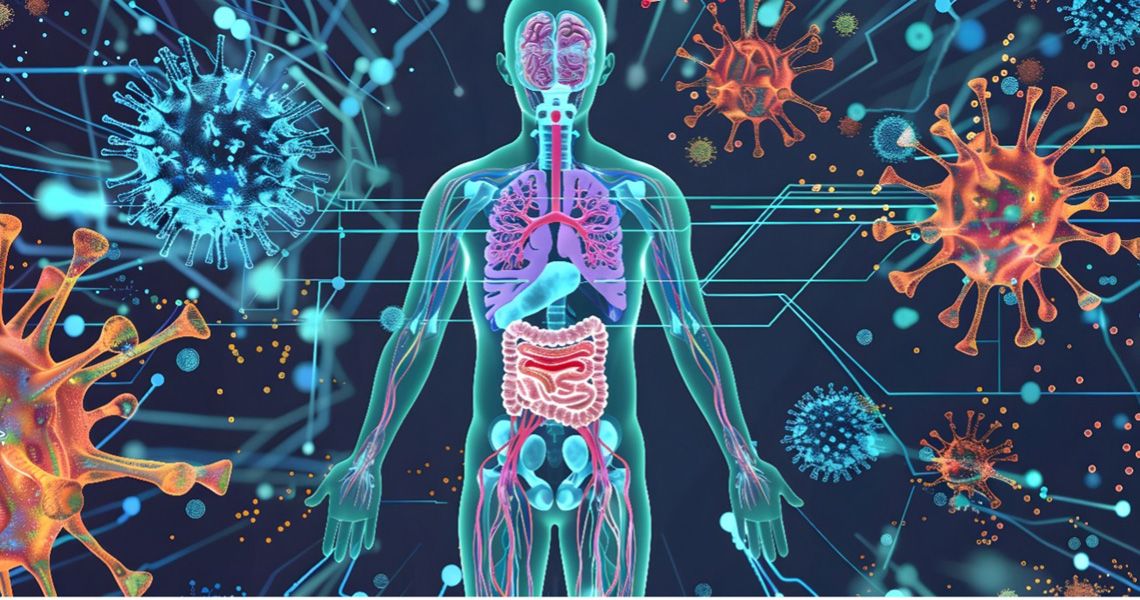Your immune system is naturally designed to identify and destroy abnormal cells by making antibodies, proteins that bind to the unwanted cells and eliminate them from your system. Cancer, though, is a sneaky disease that can develop mechanisms to evade your immune system. But what if there was a way to train your immune system to distinguish the healthy cells from the cancer cells? What if you could outsmart those tricky cancer cells and beat them at their own game? That’s the whole idea behind immunotherapy.
At its most basic level, immunotherapy can boost the immune system’s mechanisms so they are stronger in fighting cancer cells. Another way it works is to target and destroy certain receptors (proteins) found on cancerous cells to prevent them from evading the immune system.
Rohan Fernandes, PhD, Program Co-Lead of the Clinical and Translational Oncology Program at the GW Cancer Center, leads the Nanomedicine and Immunoengineering Lab, where researchers are developing and testing tiny nanoparticles to trigger robust responses from the immune system to combat cancer. These principles are not limited to cancer treatment but are also addressing other conditions, such as infectious and autoimmune diseases.
"Building on earlier breakthroughs in the field and the invaluable insights we have gained from our own work at the GW Cancer Center, we are now developing and translating novel classes of immunotherapy using our nanoparticle-based approaches. Our unwavering mission is to enhance treatment outcomes for cancer patients," affirmed Fernandes, reinforcing the center's steadfast commitment to patient care through translational research.
While these advances are developing in the lab, the GW Cancer Center is offering a range of immunotherapy treatments to eligible patients. Amarendra Neppalli, MD, GW Cancer Center’s Chief of Plasma Cell Disorders and Director of Transplant and Cellular Therapy, oversees these treatments, ensuring the highest standard of care for patients. "Immunotherapy represents an exciting new frontier in cancer treatment. By harnessing the power of the body's own immune system to fight cancer, we can offer hope and new possibilities for patients who previously had limited options,” he said. “This approach not only targets cancer more precisely but also reduces the side effects often associated with traditional treatments. As oncologists, we are thrilled to see the remarkable progress and potential of immunotherapy in transforming patient outcomes."
Immunotherapy treatments at GW Cancer Center include:
Checkpoint Inhibitors
- PD-1/PD-L1 Inhibitors: Drugs like pembrolizumab (Keytruda) and nivolumab (Opdivo) block the PD-1/PD-L1 pathway, which tumors use to hide from the immune system.
- CTLA-4 Inhibitors: Ipilimumab (Yervoy) is an example of a drug that blocks CTLA-4, another checkpoint that regulates the immune response. This enhances the ability of T-cells to attack cancer cells.
Cancer Vaccines
- These vaccines are designed to elicit an immune response against specific cancer antigens. Examples include the HPV vaccine, which prevents cervical cancer, and sipuleucel-T (Provenge), which is used to treat prostate cancer.
Monoclonal Antibodies
- These are laboratory-produced molecules that can bind to specific antigens on cancer cells. Some monoclonal antibodies mark cancer cells for destruction by the immune system, while others deliver toxins directly to cancer cells.
Cytokines
- These signaling proteins, such as interleukins and interferons, enhance the immune system’s response to cancer. Examples include interleukin-2 (IL-2) and interferon-alpha.
Immunotherapy can be used alone or in combination with surgery, radiation, and chemotherapy. Most immunotherapies, like IV fluids, are given intravenously, but they can also be given subcutaneously (under the skin) as an injection.
Immunotherapy has shown significant success in treating various cancers, including melanoma, lung, kidney, and certain types of lymphoma and leukemia. However, not all patients respond to immunotherapy, which can sometimes cause significant side effects due to the heightened immune response. The side effects can vary widely from nausea and dizziness to fever, weakness, and fatigue. The GW Cancer Center offers palliative medicine services to help manage the side effects of cancer treatment.
While immunotherapy is a standard treatment for certain cancers, other treatments are offered through clinical trials. Some cancer types cannot be treated at all by current immunotherapies. At GW Cancer Center, your healthcare team will review your options with you. Together, you can make an informed treatment decision and choose what is best for you as you make your way through your cancer journey.




